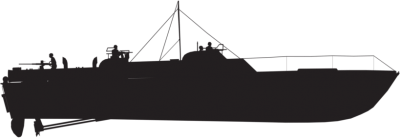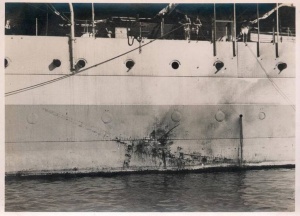AI Ship's Damage Models
They have sizes from a heavy tank up to a small city. Crew – from a couple of sailors to several thousand people. Computer-controlled ships are present in War Thunder in the majority of game modes. As mission targets, they are one of the most dangerous opponents for any pilot. Without its bombers and assault aircraft, a team often loses not to live players, but to the decisive actions of the enemy fleet. In this article, you will learn the basics of the damage model and the durability of most ships, and get recommendations on how to destroy them.
Contents
Damage Model
First of all, keep in mind that this article is about computer-controlled ships in aviation battles in any mode. Ships controlled by players and a few AI ships, that are mission targets in naval battles, have a more complex design
For an aircraft to wage an effective battle against a ship, the pilot must know the general configuration of that ship. The damage model of AI ships is quite simple to understand. Hitting any part of the ship deals an equal amount of damage, so it isn’t particularly important whether a bomb lands: on the deck or hits the cabin. However, apart from the hull, large ships have weapons that you can knock out of action with a direct hit, so aiming before attack is useful if your goal is to do as much significant damage as possible.
Every large ship also has an armour that protects her not only from frontal aircraft cannons, but also from explosions of certain force. So using, for example, a 50 kg bomb against a battleship would seem to be a doubtful endeavor.
Ships in War Thunder
This list includes the most interesting ships that you might meet in battles. Every ship represents a target vulnerable to a certain type of weaponry.
Landing Craft – a light and fast ship for transporting ground units. It is an extremely important target in most missions. This little boat is vulnerable to any weapon and relies only on her speed, one defensive machine gun whilst working in a group. Its main aim is to reach the shore and land a far more dangerous unit than the boat itself. If your goal is to defeat ground units, then destroying boats like this is your highest priority!
Destruction requires: Frontal armament of any calibre.
Patrol boat/Brander Fire boat – a light and manoeuvrable combat unit. Often encountered in locations with an abundance of islands and shelters and in historical missions. More heavily armed than a landing ship, with several high-calibre machine guns that can reliably defuse any desire to fly too close. But it has no armour, which means it still fears even low-calibre machine guns.
Destruction requires: Frontal armament of any calibre.
Cargo ship – weaponry, ammo, and rations. The holds of this ship can contain many useful things, but none of them are for you. All you get is the challenge of destroying such a target. Cargo ships don’t submit even to high-calibre machine gun fire, but they are still vulnerable to several 20mm cannons armed with AP shells. But the most effective way to destroy them is to use 50-100 kg bombs. One direct hit is usually enough. Her defensive armament consists of high-calibre machine guns. There are many of them and they are accurate, and such targets usually move in groups. Be careful.
Destruction requires: 1 x 100 kg | 1-2 x 50 kg | 1 x 920 kg torpedo | 1 x 127-132 mm rocket | High-calibre cannon fire with AP rounds.
Destroyer – a ship and a soldier. An effective escort unit. Fighter pilots can ignore a target of this class – neither their frontal weaponry nor their light bombs will be able to take it down. It is time to call in assault aircraft and bombers. A destroyer is sufficiently effective against any targets and aircraft in particular. The ship’s anti-air weaponry is very powerful and will hit you even at medium altitudes.
Destruction requires: 1 x 500 kg | 2 x 250 kg | 5 x 100 kg | 1 x 930 kg torpedo | Roughly 40 RS-type rockets
Light cruiser – don’t be fooled by this ship’s light classification. Pilots should truly beware of this unit. It’s strong enough to withstand attacks from any frontal aircraft weaponry without issue, along with hits of several 250 kg bombs. She is also well-armed to take on even several large aircraft at medium and high altitudes.
Destruction requires: 1 x 1,000 kg | 2 x 500 kg | 4 x 250 kg | 16 x 100 kg | 1-2 x 930 kg torpedoes
Heavy cruiser – shockingly, heavier than a light cruiser. :) Increased weight is aimed particularly at increasing the ship’s firepower and its threat level for your team’s AI units. See these sisters together? Destroy the beefiest first.
Destruction requires: 1 x 1,000 kg | 2 x 500 kg | 4 x 250 kg | 16 x 100 kg | 1-2 x 930 kg torpedoes
Battleship – the ultimate war machine. Highly armoured! Don’t waste rockets or bombs lighter than 250 kg on this monster. She practically doesn’t feel them. Her gunnery towers and cabin are very well protected. The hull is less heavily armoured and is vulnerable to bombs upwards of 100 kg, but you’ll have to use an awful lot of them! Such a ship usually moves with a solid escort, which makes it a very dangerous target for even a wing of bombers.
Destruction requires: 4 x 1,000 kg | 10 x 500 kg | 28 x 250 kg | 4 x 930 kg torpedoes with a minimum calibre of 533 mm
Aircraft carrier – the pride of a nation’s fleet, one of the hardest and highest-priority targets to destroy. Always moves with the support of a multitude of escort ships of all classes, since it does not possess powerful offensive weaponry – something that can’t be said of her defensive armament. She also isn’t significantly more durable than a battleship. This ship’s main function is the ability to play the role of an airfield for the allied team. It is often the only mobile airstrip, and if it is lost, the team is defeated.
Destruction requires: 2 x 1,000 kg | 5 x 500 kg | 13 x 250 kg | 3 x 930 kg torpedoes with a minimum calibre of 533 mm
Light aircraft carrier – also the pride of the fleet, but a little smaller. Of a less impressive size than her older sister and can be somewhat less durable depending on the model. In everything else, she fulfills the same functions as a primary target for bombers and a very difficult airfield to land on.
Destruction requires: 2 x 1,000 kg | 4-5 x 500 kg | 12-13 x 250 kg | 3 x 930 kg torpedoes with a minimum calibre of 533 mm
Armament Characteristics
Bombs
One strong strike is, as a rule, far more effective than a series of weak ones. This rule of thumb often works with weapons. A large bomb of 1,000 kg is significantly more effective than two 500 kg bombs, even if they land at once. This rule also works in War Thunder. For any target, be it a ship, pillbox or even a player’s tank, it will be easier to use a bomb with a large quantity of explosives, but you also shouldn’t overdo it. If your aircraft can carry only 1,000 kg of bombs, it is often far more useful to have two 500 kg bombs and send two destroyers to the bottom than to simply damage an aircraft carrier that will later be finished off by an ally.
Torpedoes
A type of weapon created specially to do battle against enemy ships. The advantage of torpedoes lies not only in their self-sustainment, which allows an aircraft that has dropped a torpedo to escape enemy fire as soon as possible, but also in the fact that they are practically guaranteed to deal damage if they hit, since a torpedo always hits the ship’s hull and has no chance to detonate on deck fittings.
Rockets
There is not much said about this type of weapon in this article, since it is a rather ineffective means of dealing with large naval targets – although rockets, in the absence of other more effective weaponry, can also be used, particularly the USA’s specialised Tiny Tim anti-ship rockets, which are roughly equal to a 250 kg bomb.
Kamikaze
The weapon of a hero leading their team to fail. The damage from a ramming strike against any ship that exceeds the aircraft in size makes a small mark on its hull – and nothing more. Stay in the skies.














